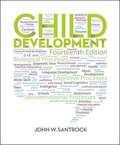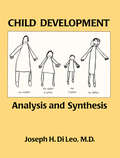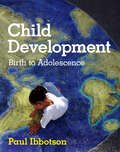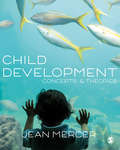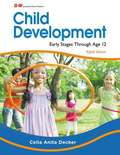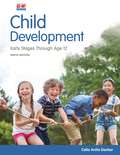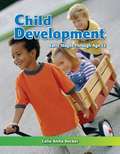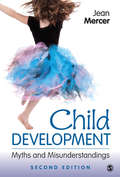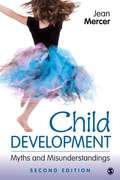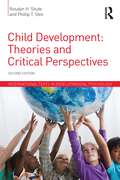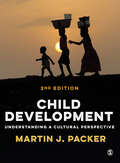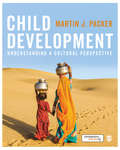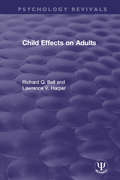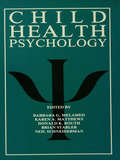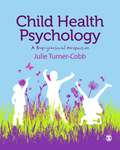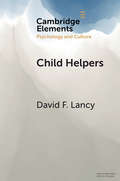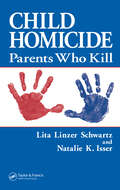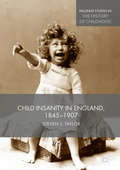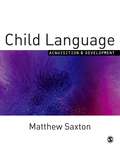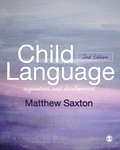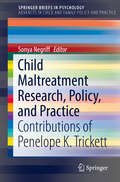- Table View
- List View
Child Development: An Introduction (Fourteenth Edition)
by John W. SantrockThorough. Accurate. Reliable. Engaging. These are just a few of the words used by adopters and reviewers of John Santrock's Child Development. The new topically-organised fourteenth edition continues with Santrock's highly contemporary tone and focus, featuring over 1,000 new citations. The popular Connections theme shows students the different aspects of children's development to help them better understand the concepts. Used by hundreds of thousands of students over thirteen editions, Santrock's proven learning goals system provides a clear roadmap to course mastery.
Child Development: Analysis And Synthesis
by Joseph di LeoFirst published in 1996. Routledge is an imprint of Taylor & Francis, an informa company.
Child Development: Birth to Adolescence
by Paul IbbotsonTake a global tour of childhood that spans 50 countries and explore everyday questions such as 'Why does love matter?', 'How do children learn right from wrong'? and 'Why do adolescent relationships feel like a matter of life and death?' Combining psychology, anthropology, and evolution, you will learn about topics such as language, morality, empathy, creativity, learning and cooperation. Discover how children's skills develop, how they adapt to solve challenges, and what makes you, you. Divided into three chronological sections – early years, middle childhood, and adolescence – this book is enriched with a full set of pedagogical features, including key points to help you retain the main takeaway of each section, space for recap, a glossary of key terms, learning outcomes and chapter summaries. Embedded videos and animations throughout bring ideas to life and explain the methods researchers use to reveal the secrets of child development.
Child Development: Concepts and Theories
by Jean A. MercerUnderstanding child development is essential to ensuring a full and rounded psychological grounding, but given the complex nature of the topic it can be a real challenge. Child Development: Concepts and Theories takes a step back to focus just on the key concepts of child development that all students must learn. With this book, their first encounters with theories and their applications will mean that they can move on with a firm foundation in child development. Central to this, is understanding how these theories or concepts are applied in the real world and how psychologists engage with them in research. This book gives clear and detailed examples to bring the subject to life. Each chapter features case studies that run throughout the chapter and develop as the students' own understanding does. Written for undergraduates, the book will become essential to any student wanting a key to unlock the world of child development. Jean Mercer is Professor Emerita of Psychology at Stockton University, New Jersey, and writes a blog, “Childmyths”, at http://childmyths.blogspot.com
Child Development: Concepts and Theories
by Jean A. MercerUnderstanding child development is essential to ensuring a full and rounded psychological grounding, but given the complex nature of the topic it can be a real challenge. Child Development: Concepts and Theories takes a step back to focus just on the key concepts of child development that all students must learn. With this book, their first encounters with theories and their applications will mean that they can move on with a firm foundation in child development. Central to this, is understanding how these theories or concepts are applied in the real world and how psychologists engage with them in research. This book gives clear and detailed examples to bring the subject to life. Each chapter features case studies that run throughout the chapter and develop as the students' own understanding does. Written for undergraduates, the book will become essential to any student wanting a key to unlock the world of child development. Jean Mercer is Professor Emerita of Psychology at Stockton University, New Jersey, and writes a blog, “Childmyths”, at http://childmyths.blogspot.com
Child Development: Early Stages Through Age 12
by Celia A. DeckerChild Development: Early Stages Through Age 12 provides students the knowledge needed to work with and care for children as they grow. All areas of development--physical, intellectual, social, and emotional--are addressed so students can better understand, assess, and meet the needs of children. The child development principles and theories of Erikson, Piaget, Vygotsky, and Gardner are highlighted. Additionally, the text explores play activities, ways to keep children healthy, and group programs. A new chapter provides additional information on brain development. Child-related occupations are discussed in detail, including duties, education requirements, and job outlook. Case Studies are included in each chapter of the book to help students relate content to real-world situations.
Child Development: Early Stages Through Age 12
by Celia Anita DeckerChild Development: Early Stages Through Age 12 explores the many stages of growth and development that children experience from the prenatal stage through the school-age years. Through an in-depth, comprehensive study of children's physical, intellectual, social, and emotional development, students will learn positive ways to care for children and meet their needs during these formative early years.
Child Development: Early Stages Through Age 12, 7th Edition
by Celia A. DeckerChild Development: Early Stages Through Age 12 is designed to help students understand how to work with and care for children as they grow. The contents of this authoritative text focus on guiding children#x19;s development and meeting developmental needs from the prenatal stage through the school-age years. The text also explores play activities, ways to keep children healthy and safe, group programs, and child-related careers. Many examples are provided to help apply this information when working with children of all ages.
Child Development: Myths and Misunderstandings
by Jean Mercer“A wonderful way to look more deeply into issues in child development.” - Sarah Jane Anderson, Mount Ida College “With its emphasis on critical thinking about child development, Mercer’s text is unique and timely. . . . Mercer has done an admirable job in selecting and tackling the topics that she does.” - Nancy Dye, Humboldt College In Child Development: Myths and Misunderstandings, 2e, Jean Mercer uses intriguing vignettes and questions about children and families to guide readers in thinking critically about 59 common beliefs. Each essay confronts commonly held misconceptions about development, encouraging students to think like social scientists and to become better consumers of media messages and anecdotal stories. The book can be assigned to parallel either chronologically or topically organized child development texts. Features and Benefits: Presents 59 short essays about child development that challenge readers to reconsider their pre-conceived notions 14 new essays in the second edition confront topics like language acquisition, adoption, discipline, and nature versus nurture. Includes carefully developed critical thinking questions at the end of each essay Offers examples of research to help students make the connection between research designs and conclusions Intrigues and engages students with the theme of dispelling myths and misconceptions and challenges them to find out if their own beliefs are correct or incorrect.
Child Development: Myths and Misunderstandings (2nd Edition)
by Jean MercerIn Child Development: Myths and Misunderstanding Second Editions, Jean Mercer uses intriguing vignettes and questions about children and families to guide readers in thinking critically about 59 common beliefs. Each essay confronts commonly held misconceptions about development, encouraging students to think like social scientists and to become better consumers of media messages and anecdotal stories.
Child Development: Theories and Critical Perspectives (International Texts in Developmental Psychology)
by Phillip T. Slee Rosalyn H. ShuteChild Development: Theories and Critical Perspectives provides an engaging and perceptive overview of both well-established and recent theories in child and adolescent psychology. This unique summary of traditional scientific perspectives alongside critical post-modern thinking will provide readers with a sense of the historical development of different schools of thought. The authors also place theories of child development in philosophical and cultural contexts, explore links between them, and consider the implications of theory for practice in the light of the latest thinking and developments in implementation and translational science. Early chapters cover mainstream theories such as those of Piaget, Skinner, Freud, Maccoby and Vygotsky, whilst later chapters present interesting lesser-known theorists such as Sergei Rubinstein, and more recent influential theorists such as Esther Thelen. The book also addresses lifespan perspectives and systems theory, and describes the latest thinking in areas ranging from evolutionary theory and epigenetics, to feminism, the voice of the child and Indigenous theories. The new edition of Child Development has been extensively revised to include considerable recent advances in the field. As with the previous edition, the book has been written with the student in mind, and includes a number of useful pedagogical features including further reading, discussion questions, activities, and websites of interest. Child Development: Theories and Critical Perspectives will be essential reading for students on advanced courses in developmental psychology, education, social work and social policy, and the lucid style will also make it accessible to readers with little or no background in psychology.
Child Development: Understanding A Cultural Perspective
by Martin J. PackerEvery child is born into a community, a society with a culture, in which they will live, grow and develop. Cultures lead to differences in children’s development, but equally important, culture is an essential component of every child’s psychological development. Taking a chronological approach, from prenatal development to adolescence, your knowledge of developmental psychology will grow with the child. To help you in your studies · Social, cognitive, emotional and physical aspects of development are interwoven to help you connect the material · You can read case studies from across the globe to enable you to compare cultures · Key research studies are highlighted to help you get to grips with the theory · You’ll be encouraged to ‘Stop and think’ and engage your critical skills You can also access revision tools online. In this new edition we′ve reduced the number of chapters so it covers only what you need to know and we′ve added a glossary to help with understanding. This textbook is essential reading for undergraduate students taking an introductory course in child development or developmental psychology.
Child Development: Understanding A Cultural Perspective
by Martin J. PackerEvery child is born into a community, a society with a culture, in which they will live, grow and develop. Cultures lead to differences in children’s development, but equally important, culture is an essential component of every child’s psychological development. Taking a chronological approach, from prenatal development to adolescence, your knowledge of developmental psychology will grow with the child. To help you in your studies · Social, cognitive, emotional and physical aspects of development are interwoven to help you connect the material · You can read case studies from across the globe to enable you to compare cultures · Key research studies are highlighted to help you get to grips with the theory · You’ll be encouraged to ‘Stop and think’ and engage your critical skills You can also access revision tools online. In this new edition we′ve reduced the number of chapters so it covers only what you need to know and we′ve added a glossary to help with understanding. This textbook is essential reading for undergraduate students taking an introductory course in child development or developmental psychology.
Child Development: Understanding A Cultural Perspective
by Professor Martin J. PackerEvery child is born into a community, a society with a culture, in which he or she will live, grow and develop. Cultures lead to differences in children’s development, but equally important, culture is an essential component of every child’s psychological development. Child Development takes a chronological approach, from prenatal development to adolescence, in which social, cognitive, emotional and physical aspects of development are interwoven. Martin Packer integrates cross-cultural examples from different parts of the world to illustrate how culture plays a constitutive role in children’s development. This book includes an in-depth discussion of human evolution, the history of language and the human lifespan, as well as the theoretical perspectives of scientific research on children’s development. This textbook is essential reading for undergraduate students taking an introductory course in child development or developmental psychology.
Child Development: Understanding A Cultural Perspective
by Professor Martin J. PackerEvery child is born into a community, a society with a culture, in which he or she will live, grow and develop. Cultures lead to differences in children’s development, but equally important, culture is an essential component of every child’s psychological development. Child Development takes a chronological approach, from prenatal development to adolescence, in which social, cognitive, emotional and physical aspects of development are interwoven. Martin Packer integrates cross-cultural examples from different parts of the world to illustrate how culture plays a constitutive role in children’s development. This book includes an in-depth discussion of human evolution, the history of language and the human lifespan, as well as the theoretical perspectives of scientific research on children’s development. This textbook is essential reading for undergraduate students taking an introductory course in child development or developmental psychology.
Child Effects on Adults (Psychology Revivals)
by Richard Q. Bell Lawrence V. HarperIt is usual to consider the effects parents have on children; this title, originally published in 1977, reverses the focus and reveals a subject every bit as important and interesting. The authors, both professional psychologists, present their findings under three major headings – "History", "Theories and Research Approaches" and "Concepts and Findings" – that discuss the social, psychological, and biological influences children exert on parents. Bell and Harper oppose the "intellectual apartheid" that prevents behavioural scientists from investigating "the continuity of interaction processes from other animals to man" and include substantial research findings in mammalian biology to show more precisely the reciprocal relations between parents and their offspring. Their "bidirectional approach" to the study of child-rearing is meant to offset empirical prejudices that had so far dominated child-care sciences at the time.
Child Health Psychology
by Neil Schneiderman Barbara G. Melamed Karen A. Matthews Brian Stabler Donald K. MatthewsThis unique text offers an interdisciplinary collection of the most current articles concerning the scientific study of Child Health Psychology. The subjects of many articles are applicable to pediatrics, family medicine, child nursing, developmental, clinical child, and pediatric psychology. Emphasizing the scientific basis of the field, this empirical research is invaluable to the specialist, teacher, or student seeking the most contemporary research methods used to study psychological aspects of children's health care.
Child Health Psychology: A Biopsychosocial Perspective
by Dr Julie Turner-CobbChild Health Psychology: A Biopsychosocial Perspective is the first sole-authored textbook dedicated to the topic of health psychology as it applies to children and adolescents, drawing on research from several related disciplines including psychoneuroimmunology and developmental psychobiology. With an overarching biopsychosocial lifespan perspective, Turner-Cobb examines the effects of early life experience on health outcomes, as well as covering the experience of acute and chronic illness during childhood. Lots of helpful aids are provided per chapter including key learning objectives, textboxes putting spotlights on key pieces of research, lists of key concepts to revise, useful websites and further reading suggestions.<P> With a perspective designed to both inform and to challenge, this stimulating textbook will introduce you to the central relevance and many applications of child health psychology. It will be of interest to final year undergraduate and postgraduate students in health and clinical psychology, as well as to students in health sciences, nursing, and childhood studies.
Child Helpers: A Multidisciplinary Perspective (Elements in Psychology and Culture)
by David F. LancyIn most of the worlds' distinct cultures, children – from toddlerhood – eagerly volunteer to help others with their chores. Laboratory research in child psychology supports the claim that the helper “stage” is biologically based. This Element examines the development of helping in varied cultural contexts, in particular, reviewing evidence for supportive environments in the ethnographic record versus an environment that extinguishes the drive to be helpful in WEIRD children. In the last section, the benefits of the helper stage are discussed, specifically the development of an ability to work and learn collaboratively.
Child Homicide: Parents Who Kill
by Lita Linzer Schwartz Natalie IsserFrom governments that enact population-limiting legislation or commit wholesale neonaticide, to families who purposely allow a weak, infirm, or unfavorably gendered infant to perish rather than expend limited resources, neonaticide, infanticide, and filicide, are practiced on every continent and by every level of cultural complexity. Taking
Child Insanity in England, 1845-1907
by Steven TaylorThis book explores the treatment, administration, and experience of children and young people certified as insane in England during the nineteenth and early twentieth centuries. It uses a range of sources from Victorian institutions to explore regional differences, rural and urban comparisons, and categories of mental illness and mental disability. The discussion of diverse pathways in and out of the asylum offers an opportunity to reassess nineteenth-century child mental impairment in a broad social-cultural context, and its conclusions widen the parameters of a ‘mixed economy of care’ by introducing multiple sites of treatment and confinement. Through its expansive scope the analysis intersects with topics such as the history of childhood, institutional culture, urbanisation, regional economic development, welfare history, and philanthropy.
Child Language
by Matthew SaxtonSaxton (education, U. of London) presents a textbook for a graduate or undergraduate course primarily for students of psychology who are interested in child language. There being no reason whatsoever for psychology major to have had any training in linguistic theory, he assumes nothing, and explains even such terms as verb and noun. He covers landmarks in the landscape of child language, whether animals can acquire human language, the critical-period hypothesis, input and interaction, language in the first year, the developing lexicon, the acquisition of morphology, linguistic nativism, the usage-based approach, and nature and nurture. Annotation ©2011 Book News, Inc. , Portland, OR (booknews. com)
Child Language: Acquisition and Development
by Matthew SaxtonThis is the best book on the market for taking students from ‘how children acquire their first language’ to the point where they can engage with key debates and current research in the field of child language. No background knowledge of linguistic theory is assumed and all specialist terms are introduced in clear, non-technical language. It is rare in its balanced presentation of evidence from both sides of the nature–nurture divide and its ability to make this complicated topic engaging and understandable to everyone. This edition includes Exercises to foster an understanding of key concepts in language and linguistics A glossary of key terms so students can always check back on the more difficult terms Suggestions for further reading including fascinating TED Talks that bring the subject to life Access to Multiple Choice Quizzes and other online resources so students can check they've understood what they have just read
Child Language: Acquisition and Development
by Matthew SaxtonThis is the best book on the market for taking students from ‘how children acquire their first language’ to the point where they can engage with key debates and current research in the field of child language. No background knowledge of linguistic theory is assumed and all specialist terms are introduced in clear, non-technical language. It is rare in its balanced presentation of evidence from both sides of the nature–nurture divide and its ability to make this complicated topic engaging and understandable to everyone. This edition includes Exercises to foster an understanding of key concepts in language and linguistics A glossary of key terms so students can always check back on the more difficult terms Suggestions for further reading including fascinating TED Talks that bring the subject to life Access to Multiple Choice Quizzes and other online resources so students can check they've understood what they have just read
Child Maltreatment Research, Policy, and Practice: Contributions of Penelope K. Trickett (SpringerBriefs in Psychology)
by Sonya NegriffThe brief provides an overview of Dr. Penelope K. Trickett’s work and explores her innovations in the areas of theory, measurement, and methodology in the study of child maltreatment. It offers a summary of Dr. Trickett’s seminal longitudinal studies on child maltreatment, including their influence on understanding the impact of sexual abuse and child maltreatment on female and adolescent development. Chapters examine the impact of her work on policy and practice and offer present four new empirical studies that have been directly influenced by Dr. Trickett’s contributions. The brief concludes with further research recommendations to bridge the current policy and practice gaps. Topics featured in this brief include:Childhood sexual abuse and its effect on eating disorder development in females.The traumatic nature of reporting maltreatment in adolescents.Associations between adolescents’ community violence exposure (CVE) and the development of aggressive behavior problems. Child sexual abuse experiences in Korea. Child Maltreatment Research, Policy, and Practice is a must-have resource for policy makers and related professionals, graduate students, and researchers in child and school psychology, family studies, public health, social work, law/criminal justice, and sociology.
